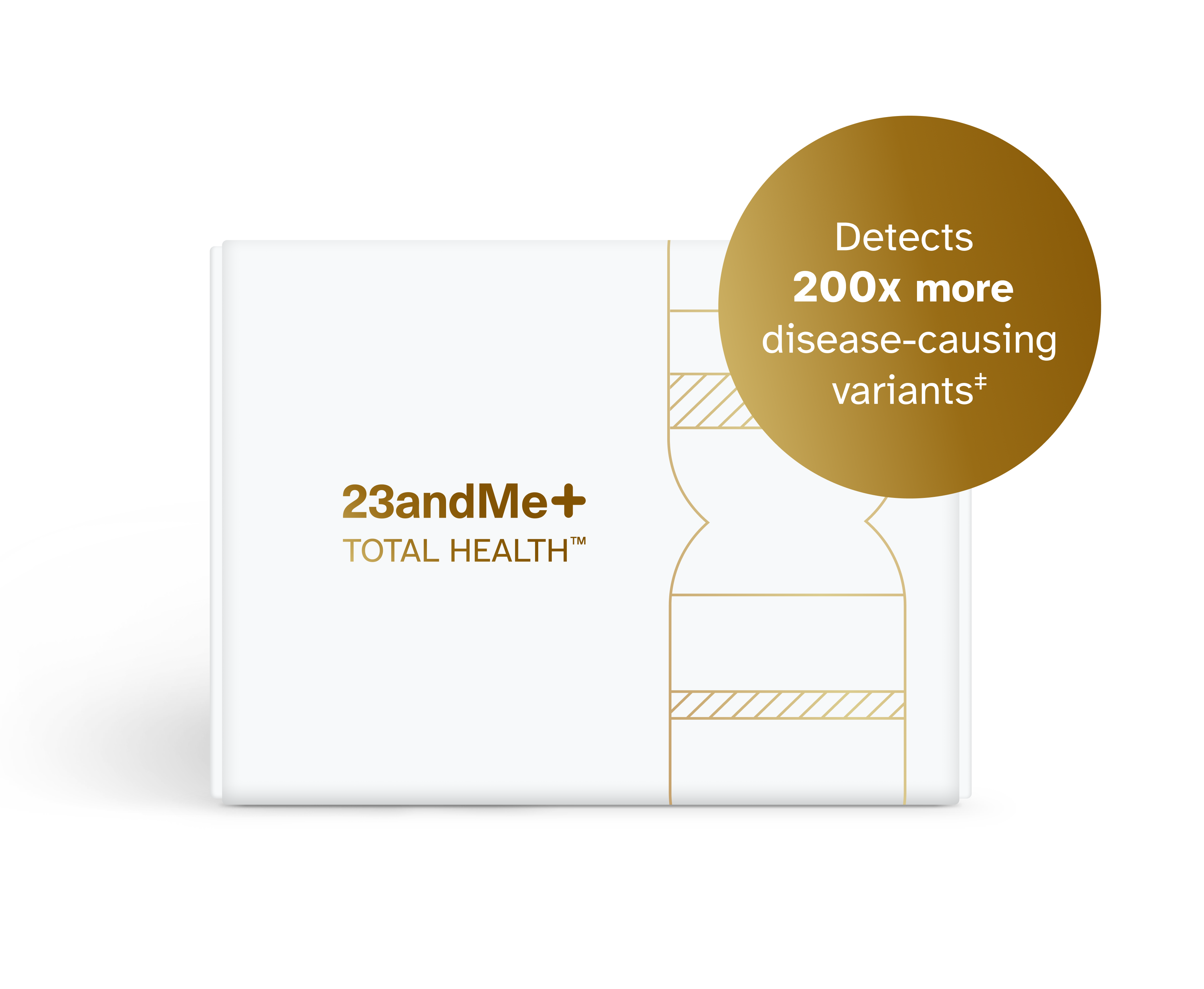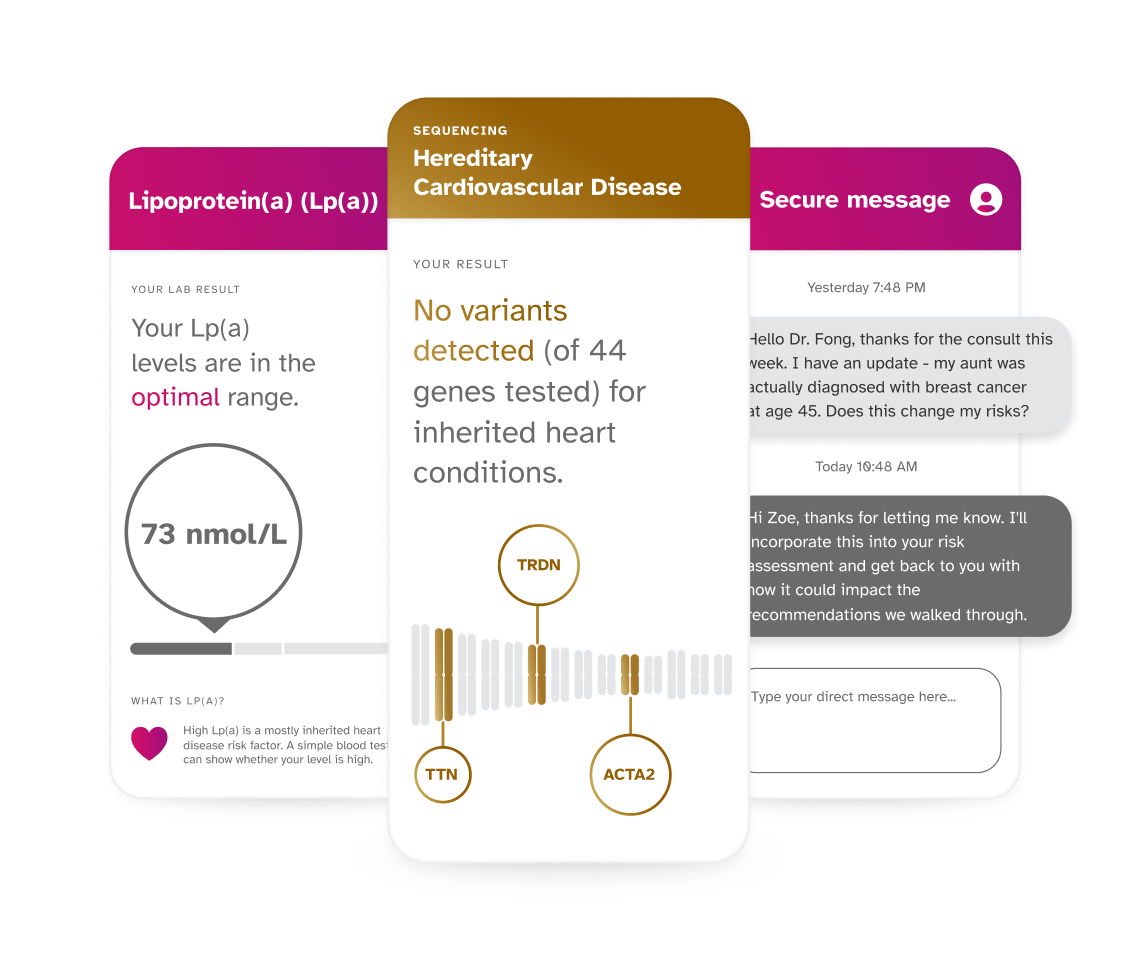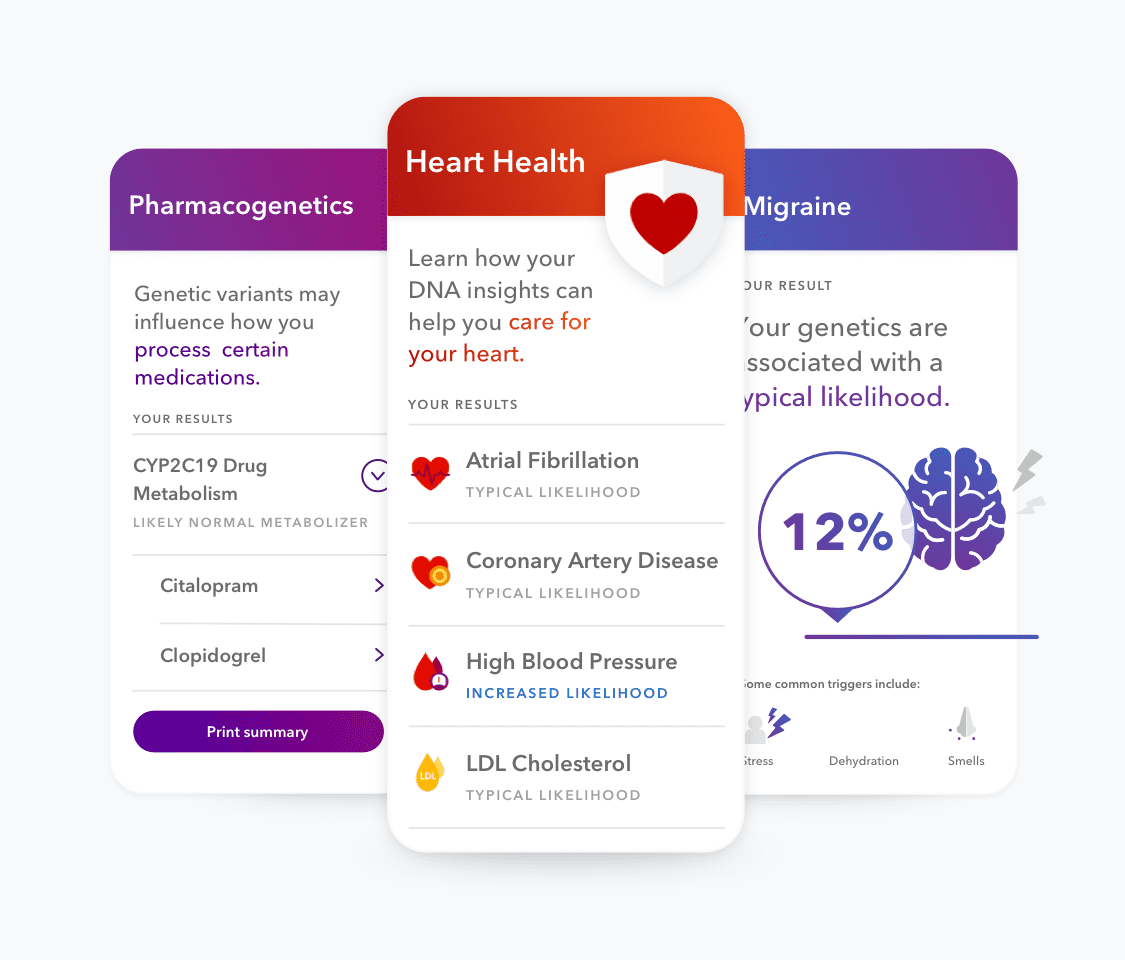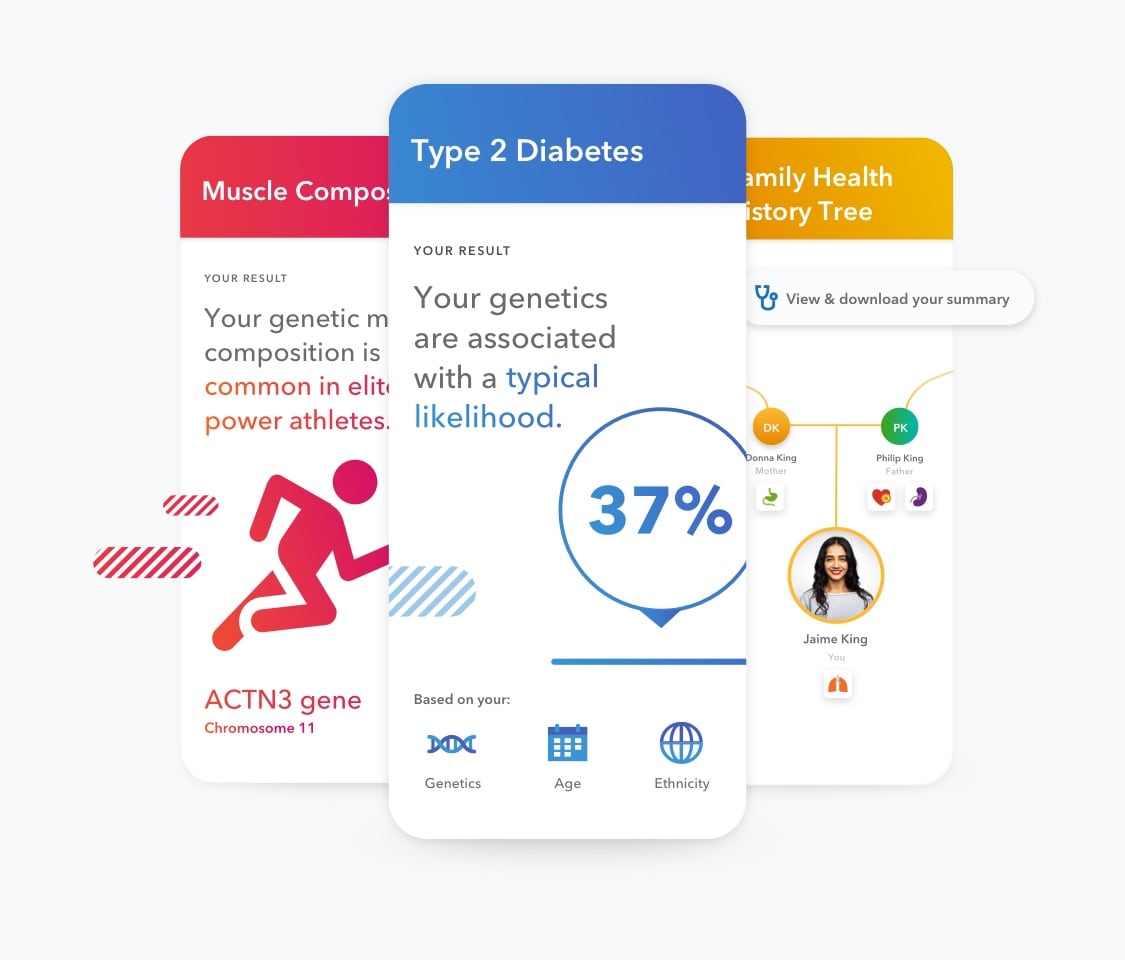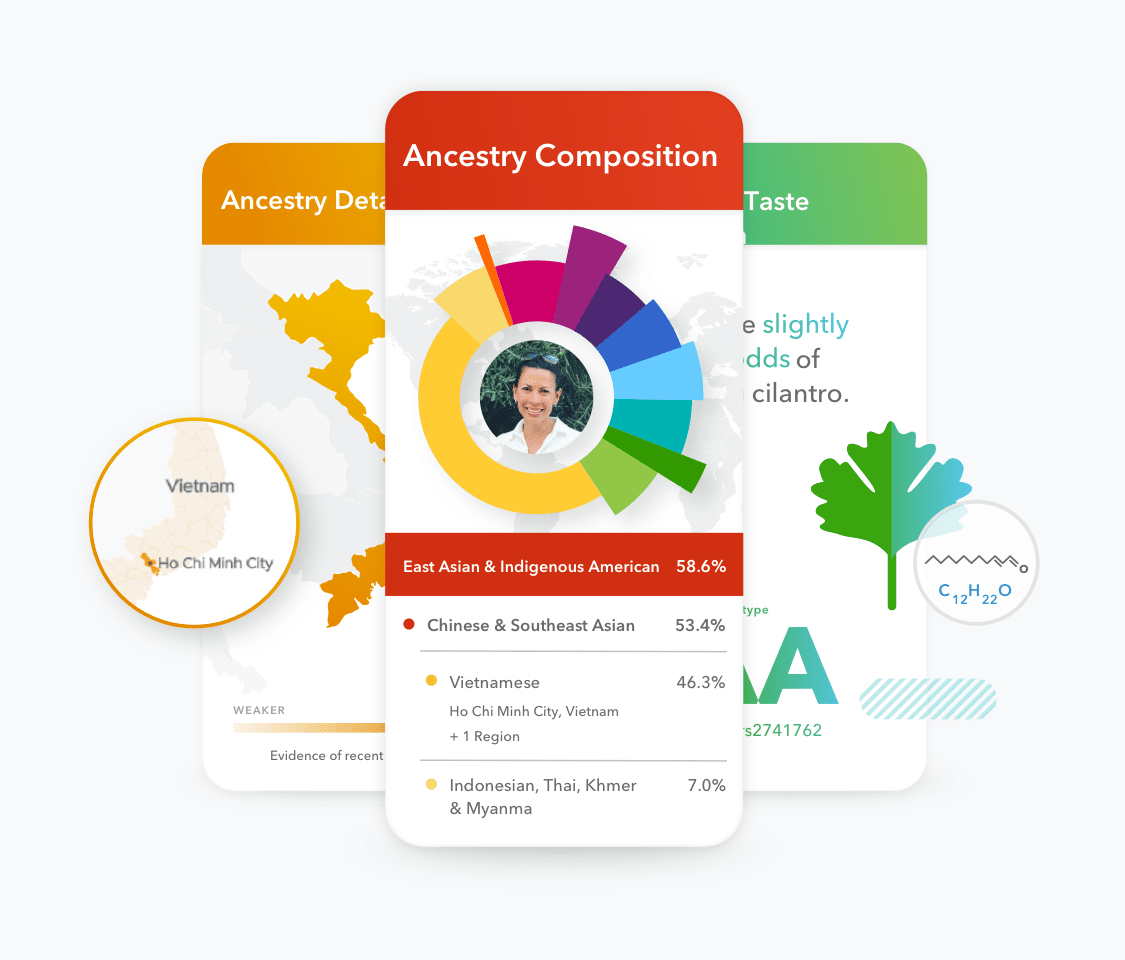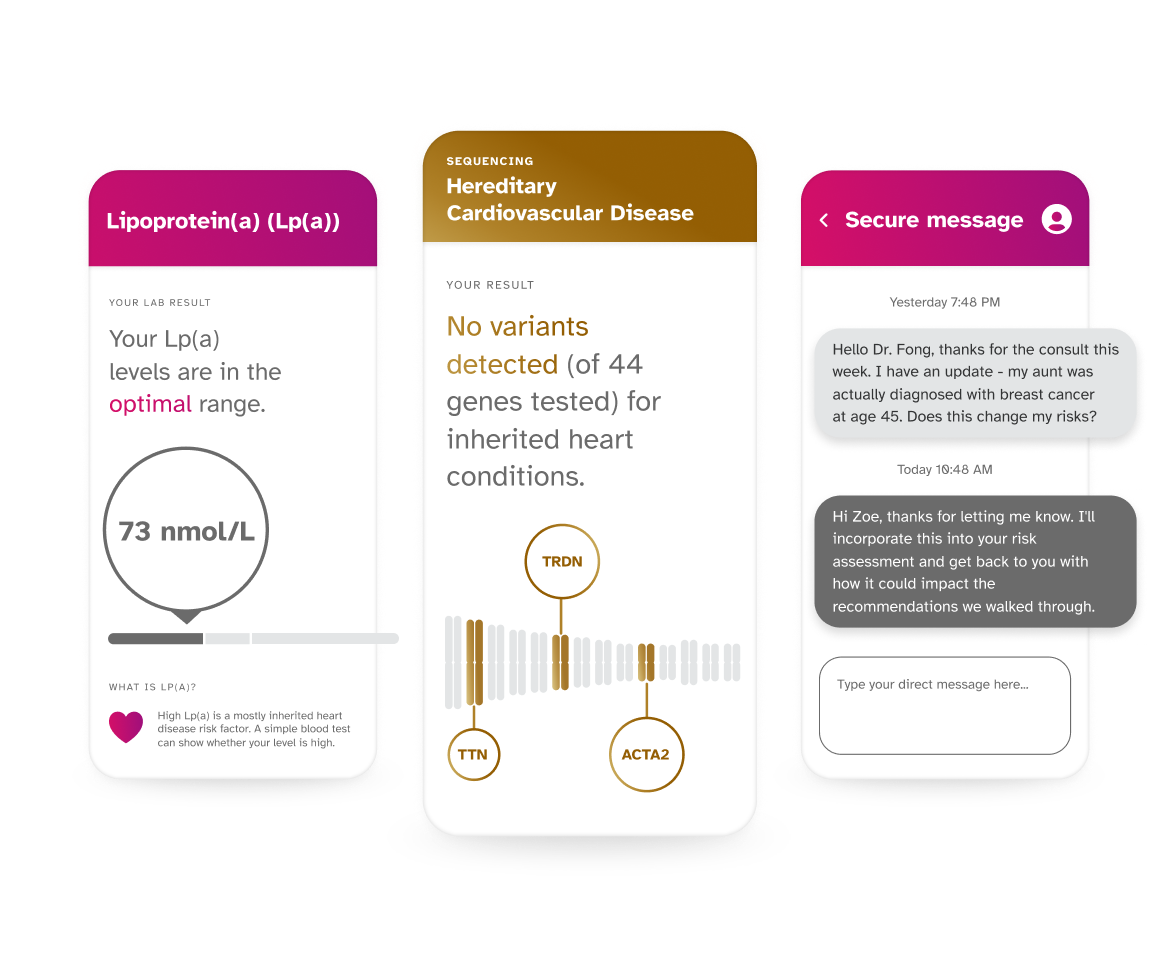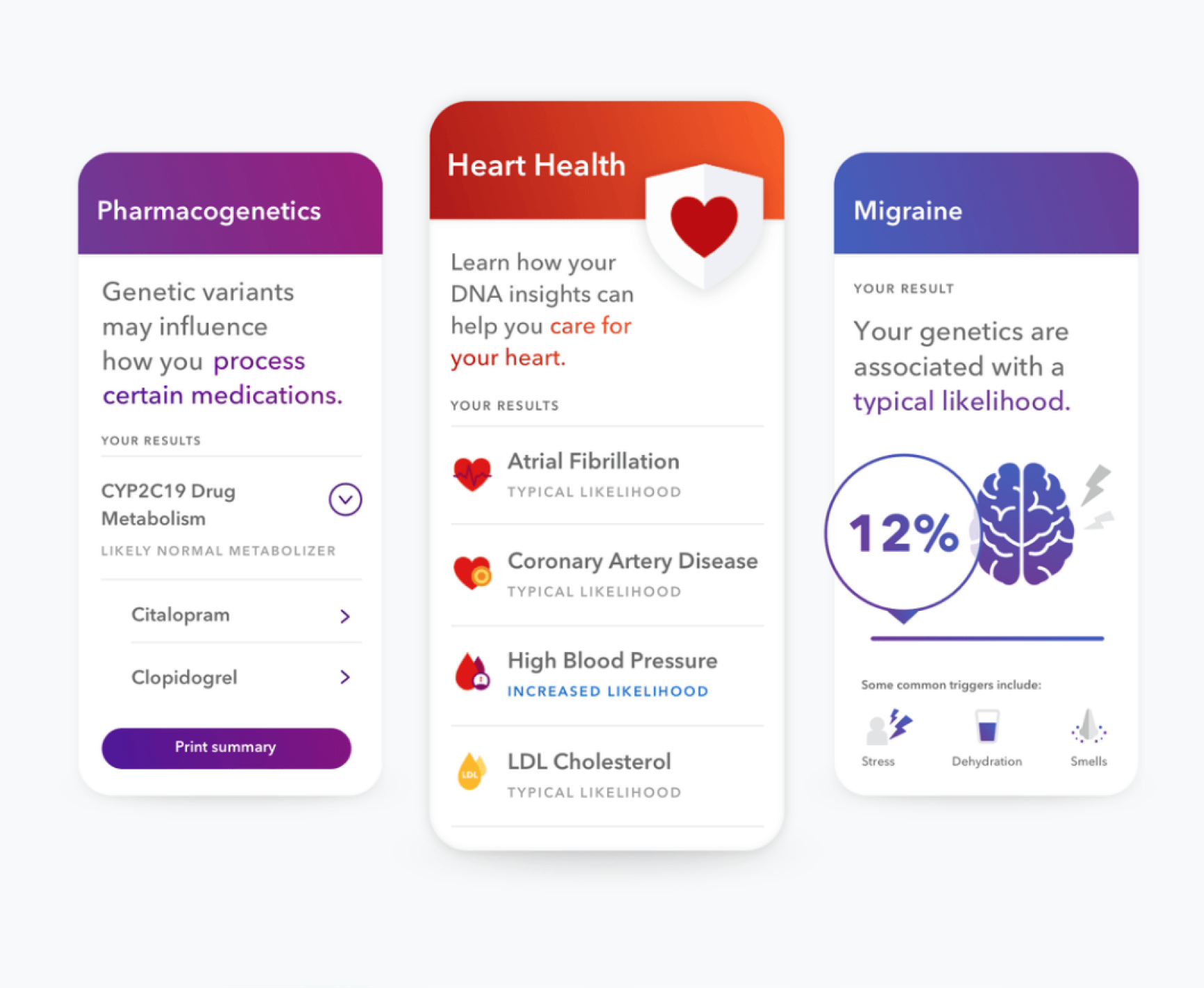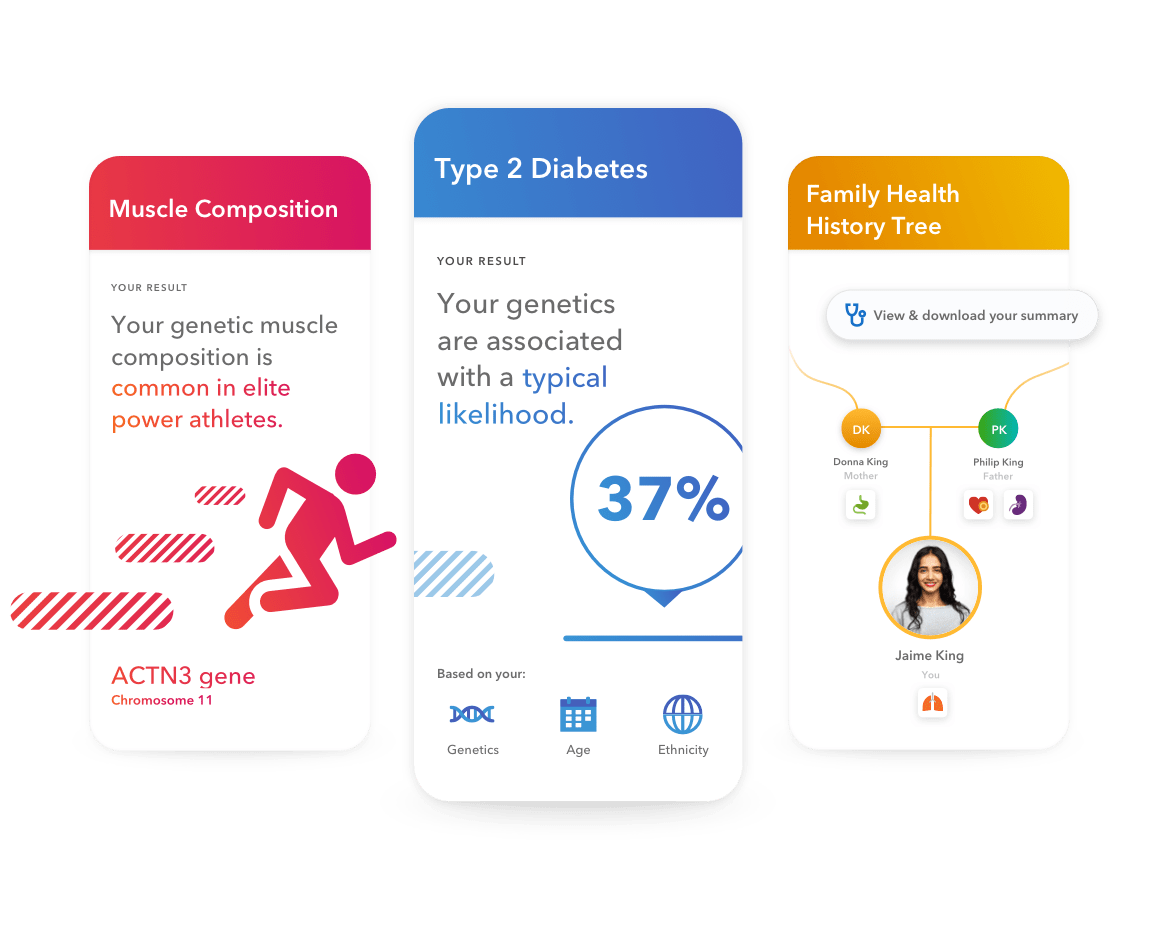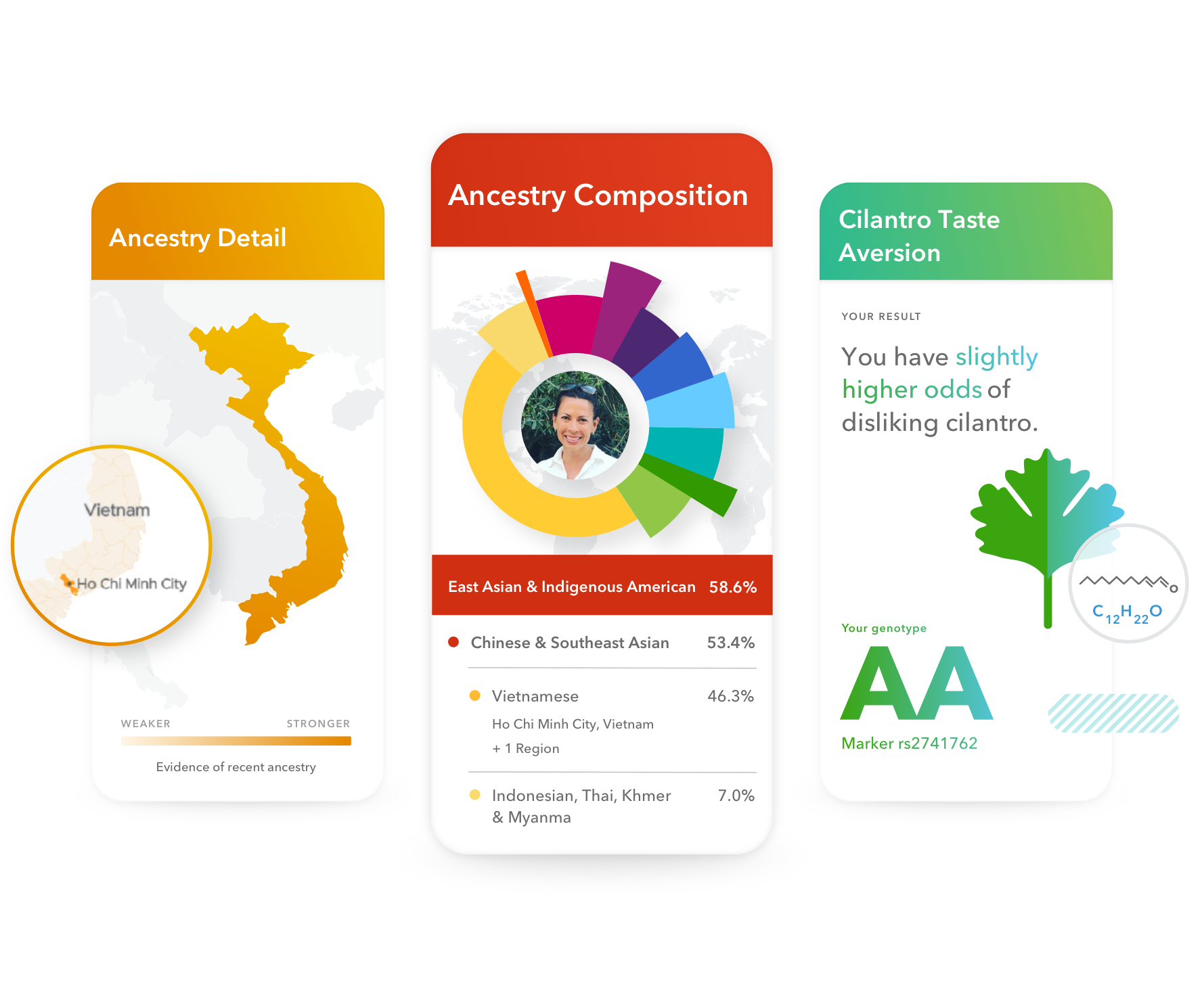Get our most advanced and comprehensive health membership that combines next-generation exome sequencing, blood testing and direct access to clinical services. Members will get personalized recommendations with a focus on ongoing prevention and early detection.
- Next-generation exome sequencing: Clinician-ordered advanced genetic testing that screens for 55+ clinically actionable and under-diagnosed conditions.
- Biannual blood testing: Advanced cardiometabolic biomarkers plus insights into your thyroid, liver, kidneys, and more - all initiated by a clinician.
- Access to clinicians with training in genetics-based care: Unlimited direct messaging, plus a dedicated virtual consultation annually.
- Includes 23andMeplus PremiumTM: 190+ personalized genotyping reports with ongoing new reports and features delivered throughout the year.
Not available to residents of HI, NJ, NY, OK, RI and US territories. Not currently available to existing 23andMe customers. Sign up to be the first to know when it’s available.
‡Our genotyping product detects 250 health-related variants in our Carrier Status and Genetic Health Risk reports. The Exome Sequencing reports detect 50,000+ hereditary disease-causing variants.
Our new membership
23andMeplus Total Health members get the most advanced and comprehensive insights and recommendations we offer.
190+ genotyping reports on your ancestry, health, wellness, traits and more. Important test info.
- Exome
SequencingInterpretations of 100+ genes linked to 55+ conditions
- Biannual
Blood TestingAnalysis of 55+
blood biomarkers - Genetics-Based
Clinical CareVirtual clinical consultation and unlimited messaging
Exome Sequencing.Early detection and prevention powered by clinical-grade sequencing.
Exome sequencing is comprehensive genetic testing that analyzes a portion of your total DNA which contains the majority of genetic variants associated with disease risk. 23andMeplus Total Health offers clinician-ordered exome sequencing and clinical interpretations of 100+ high impact genes associated with 55+ health conditions that, if detected early, may have effective preventive measures and clinical interventions. You’ll get 6 reports, including:
Includes conditions that increase your risk for arrhythmia, heart attacks, and aneurysms.
Image Description: A sample result for Hereditary Cardiovascular Disease report; "No variants detected (of 44 genes tested) for inherited heart conditions."
Includes conditions that increase your risk for breast, ovarian, and colorectal cancer.
Image Description: A sample result for Hereditary Cancer report; "No variants detected (of 33 genes tested) for hereditary cancers."
Includes conditions like Parkinson's and Alzheimer's Disease.
Image Description: A sample result for Hereditary Neurological Disease report; "A variant was detected in the APOE gene." The e2 variant in the APOE gene is associated with a reduced risk for Alzheimer’s disease.
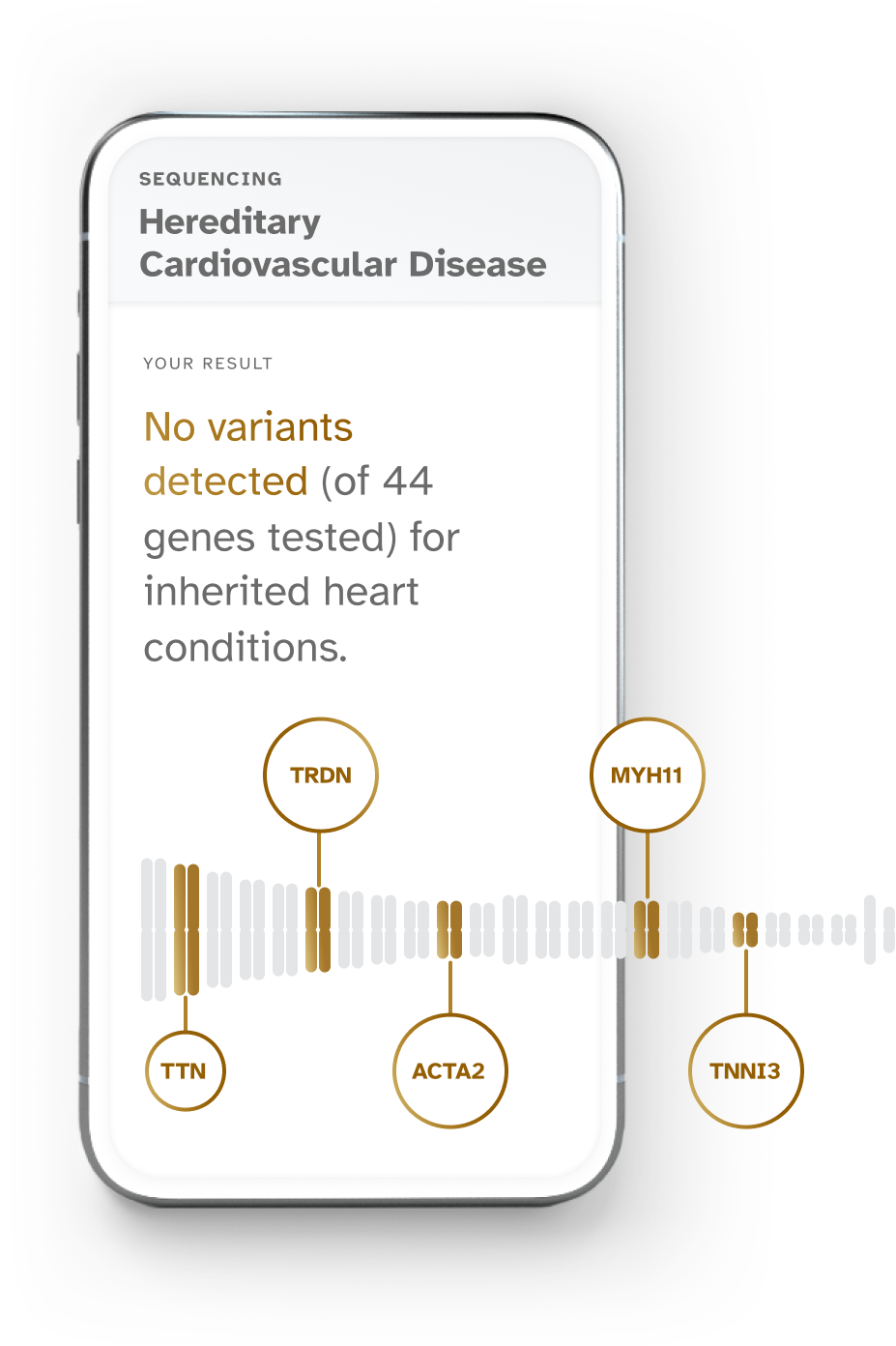
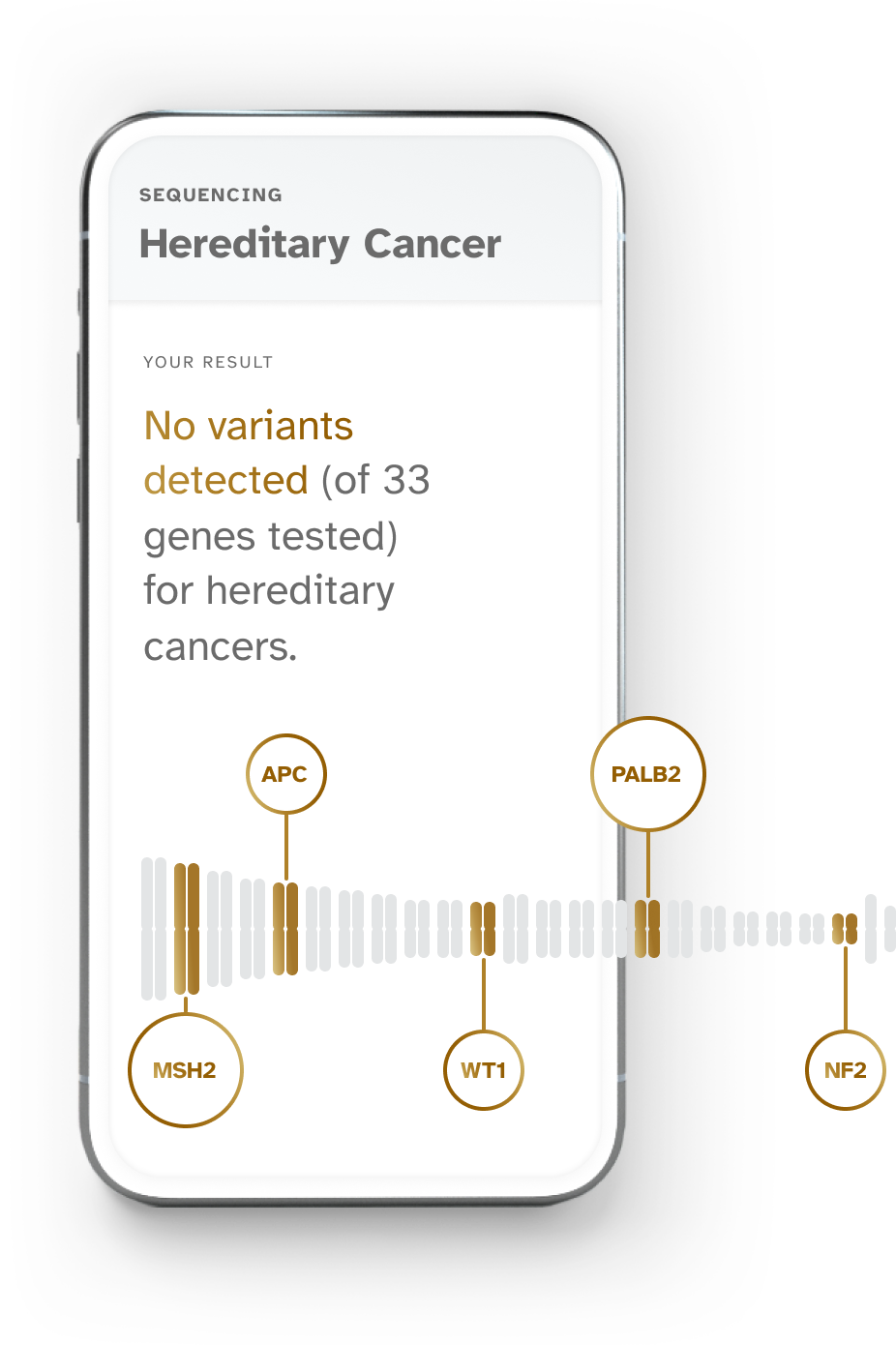
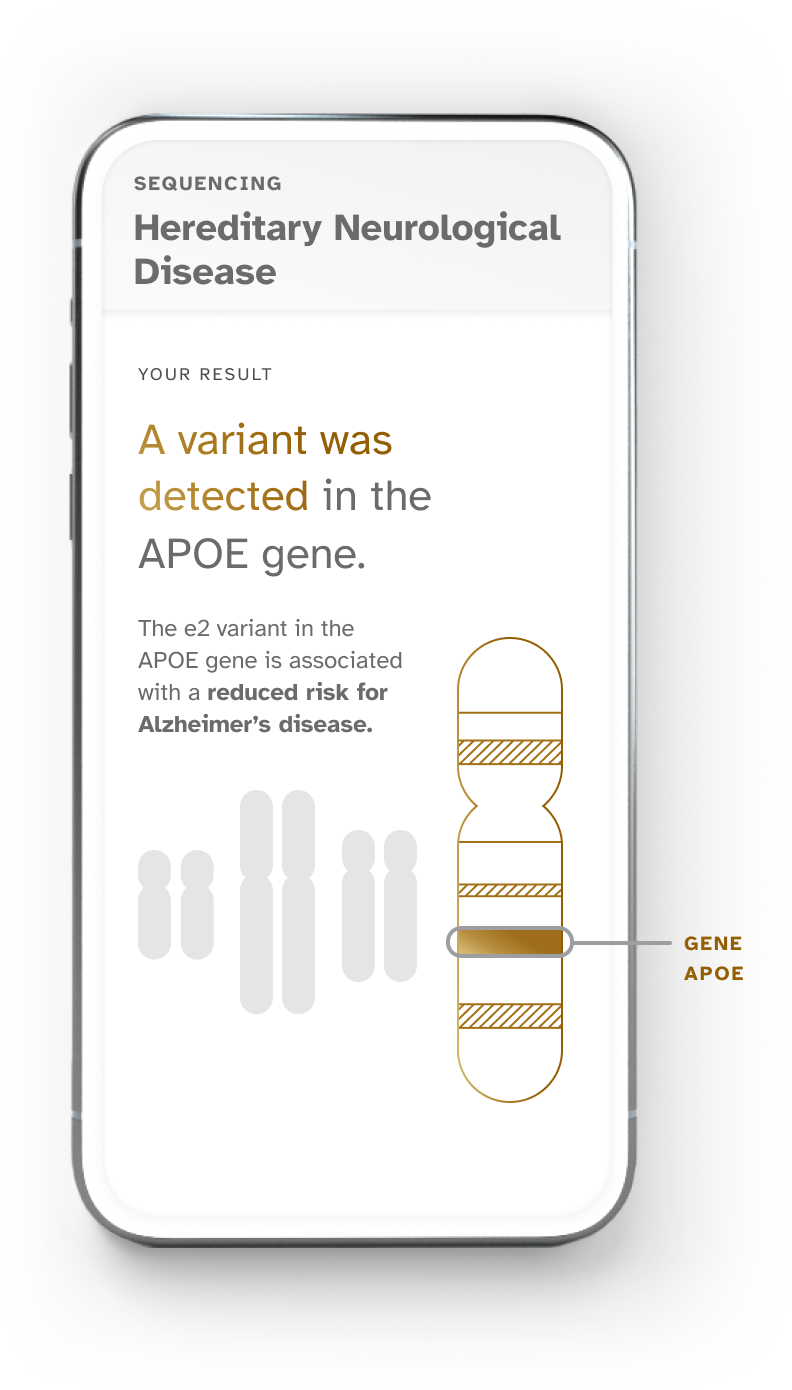
Hereditary Cardiovascular Disease
Includes conditions that increase your risk for arrhythmia, heart attacks, and aneurysms.
Blood Testing.Genetics provides insight into the future. Labs provide insight into the now.
Get comprehensive blood tests that assess 55+ biomarkers, including ones that go beyond your routine labs. Biannual testing allows you to track results and measure progress all within your 23andMe account. Blood testing is initiated by a clinician and offered at one of Quest Diagnostics’ convenient patient service centers. Biomarkers include:
Thyroid disorders can have a big impact on your health, but are often undiagnosed. TSH is used to identify hypothyroidism (too little thyroid hormone) or hyperthyroidism (too much).
Image Description: A sample result for Thyroid-stimulating hormone (TSH) report; "Your TSH levels are in the normal range." What is TSH? TSH (Thyroid-stimulating hormone) helps control the level of thyroid hormones in the blood.
Rarely tested, Lp(a) is the stickiest of the “bad” cholesterols and most likely to cause blockages in the arteries, increasing risk for cardiovascular disease.
Image Description: A sample result for Lipoprotein(a) (Lp(a)) report; "Your Lp(a) levels are in the optimal range." What is Lp(a)? High Lp(a) is a mostly inherited heart disease risk factor. A simple blood test can show whether your level is high.
In addition to other cholesterol testing, ApoB is being recognized as a key part of providing a more accurate and complete picture of a person’s overall risk for cardiovascular disease.
Image Description: A sample result for Apolipoprotein B (ApoB) report; "Your ApoB levels are in the moderate range." What is ApoB? Apolipoprotein B (ApoB) is the main protein in several types of “bad” cholesterol particles in the blood.
HbA1c can help in diagnosing and monitoring prediabetes and diabetes. Most people are unaware they have prediabetes due to lack of symptoms so testing is the only way to uncover it.
Image Description: A sample result for Hemoglobin A1c (HbA1c) report; "Your HbA1c levels are in the abnormal range." What is HbA1c? HbA1c shows average blood sugar level and can be helpful for understanding long-term trends in blood sugar.
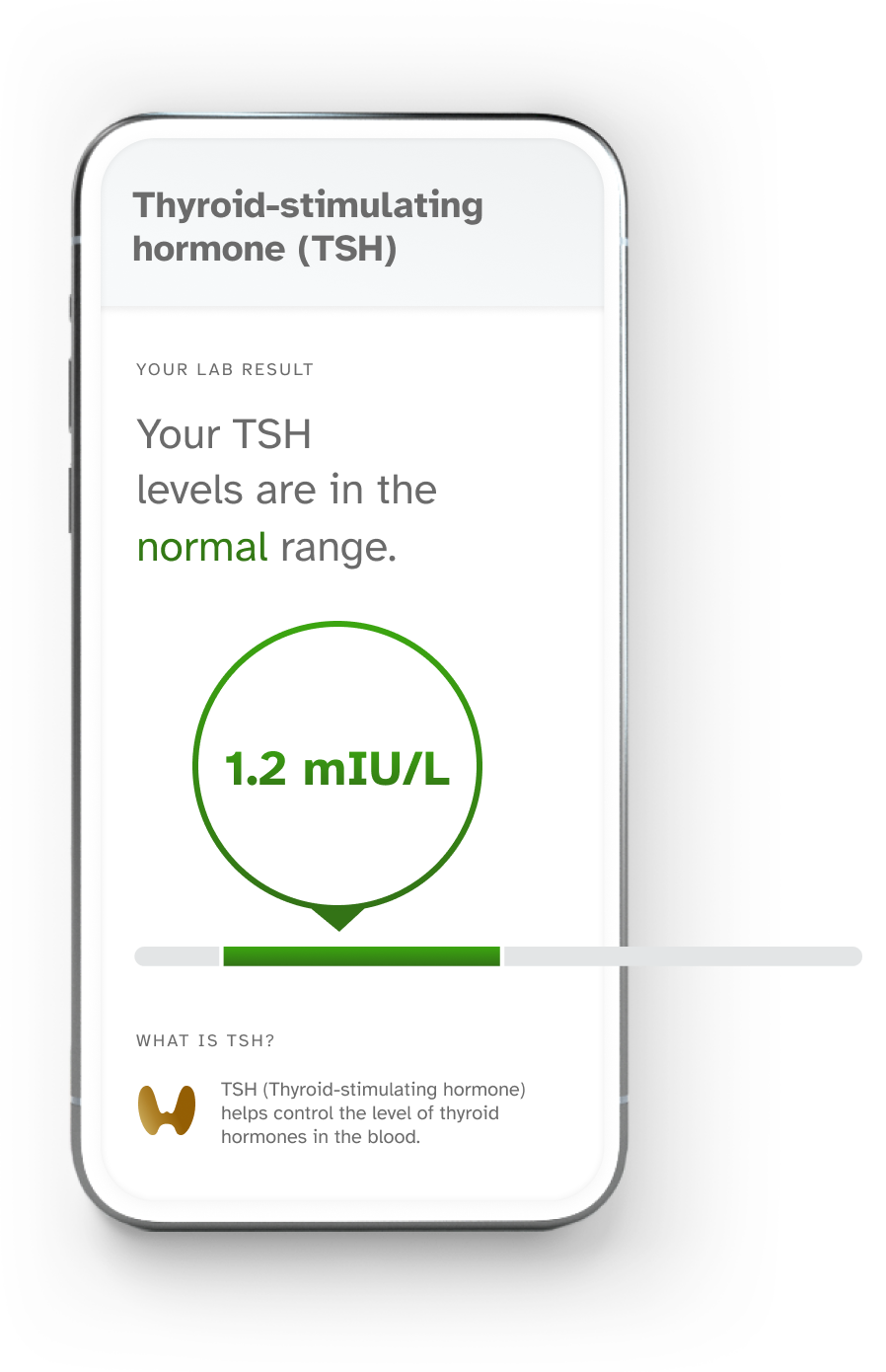
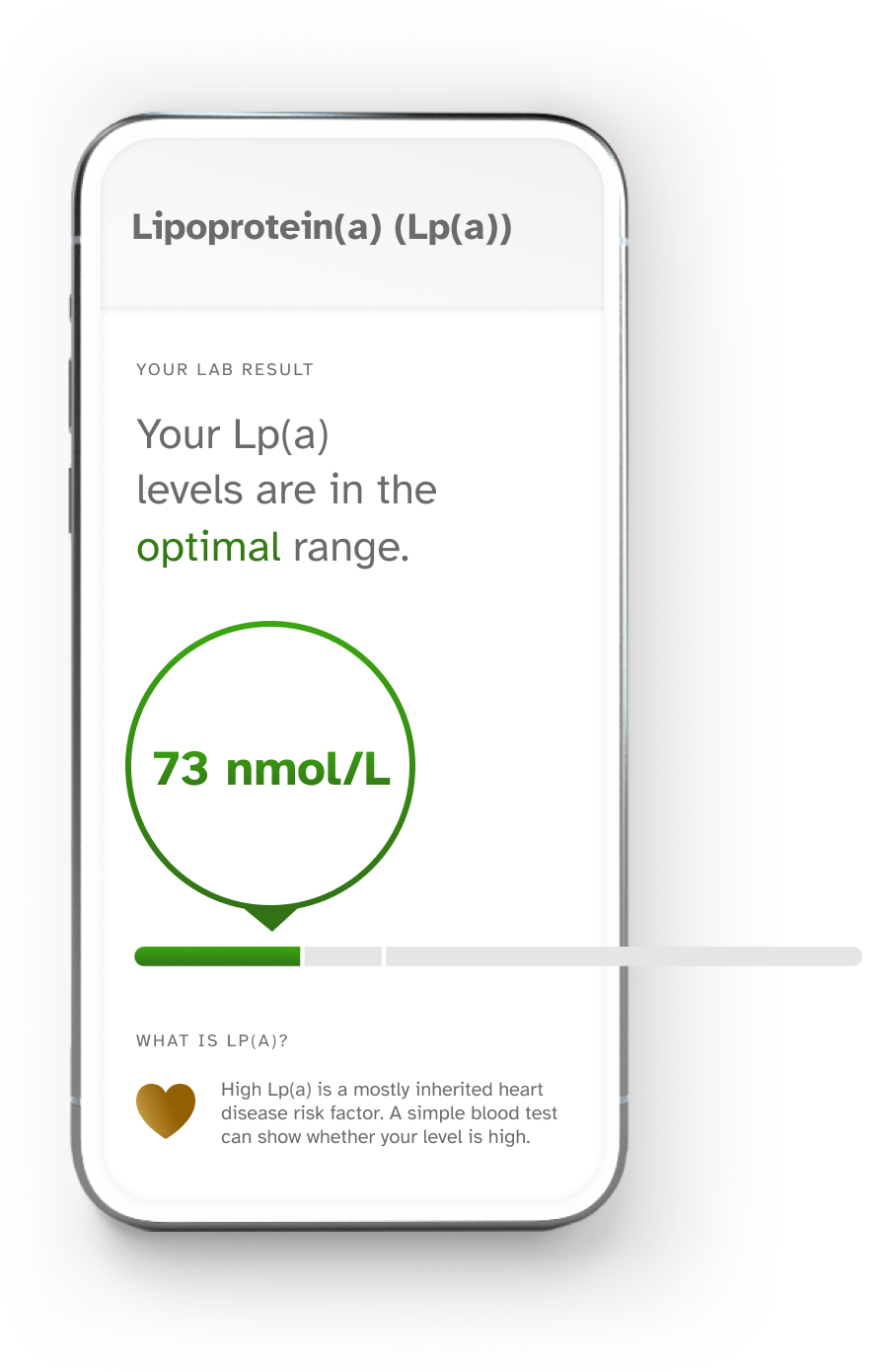
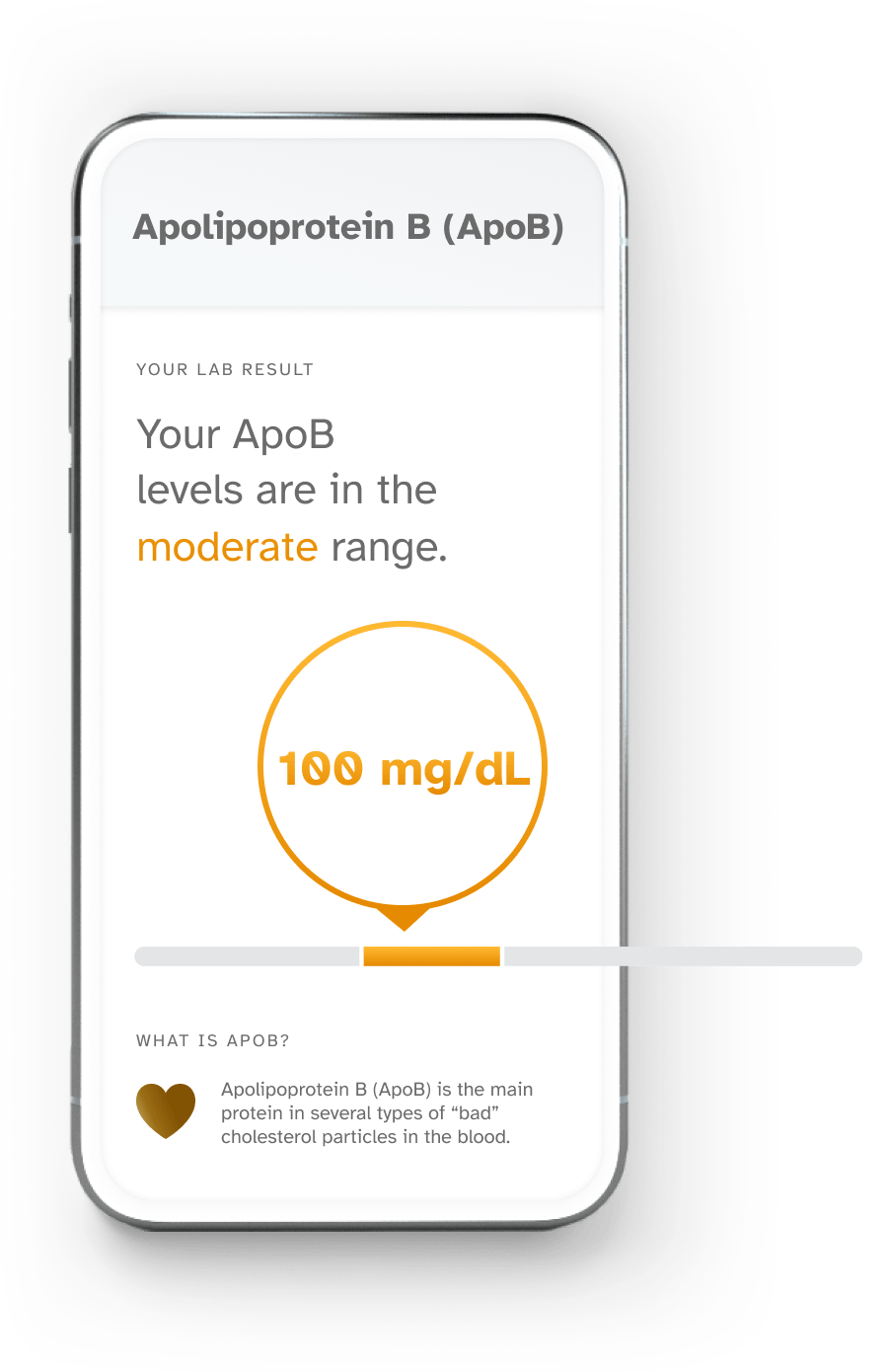
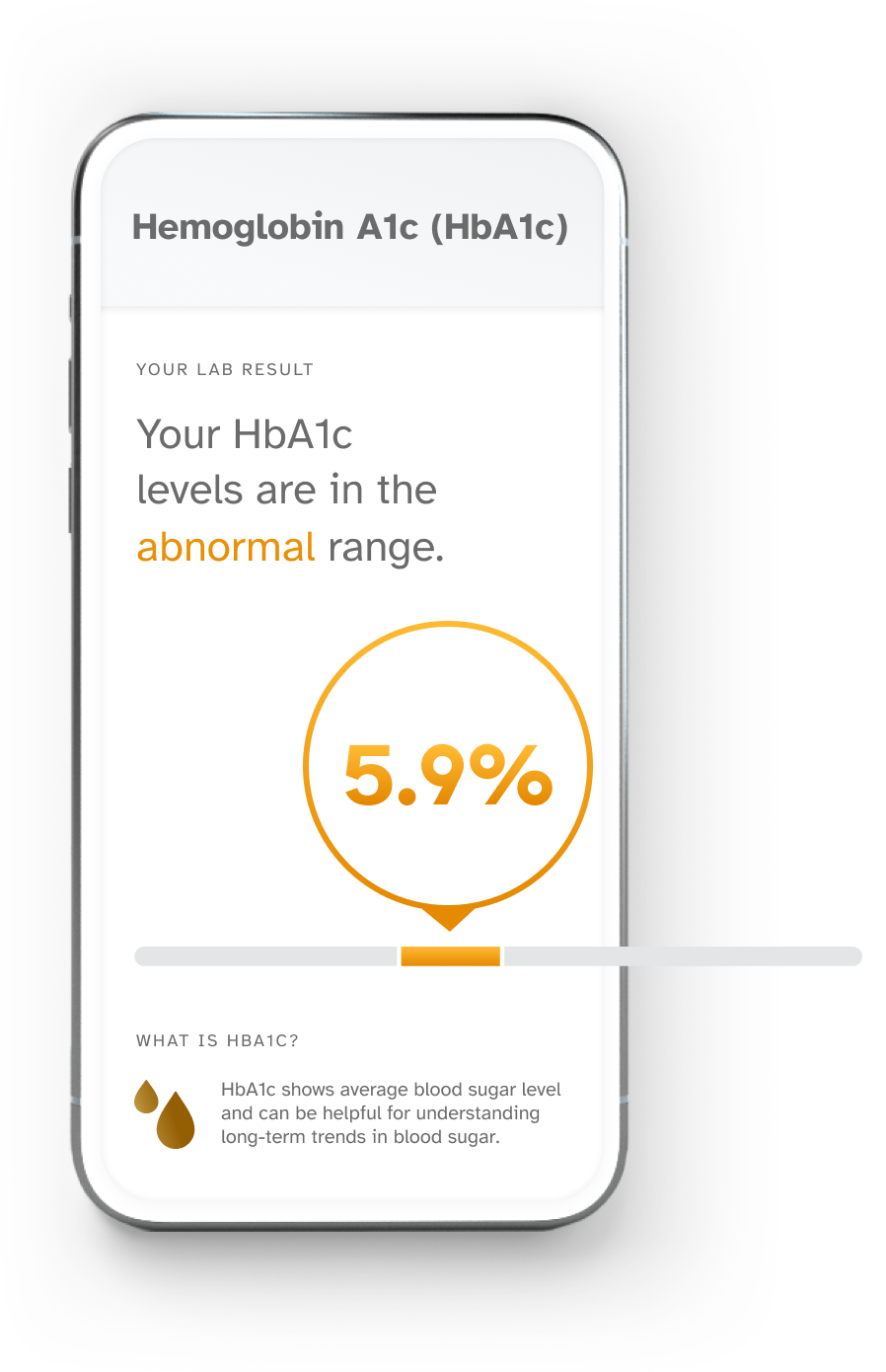
Thyroid-stimulating hormone (TSH)
Thyroid disorders can have a big impact on your health, but are often undiagnosed. TSH is used to identify hypothyroidism (too little thyroid hormone) or hyperthyroidism (too much).
Clinical Consultation.Clinicians with unique knowledge and training in genetics-based care.
These clinicians are committed to you on your preventive health journey. Together, you can discuss your genetic reports, blood test results, family history, lifestyle and more to understand your risks and build a preventive health plan that’s tailored to you - all within your 23andMe account.
A dedicated consultation to help you better understand your reports, generate risk assessments and provide next steps, with the ultimate goal of prevention.
Image Description: A sample secure message exchange between a patient and clinician
Have ongoing conversations with clinicians about your reports, your progress or questions about your health journey.
Image Description: A sample secure message exchange between a patient and clinician
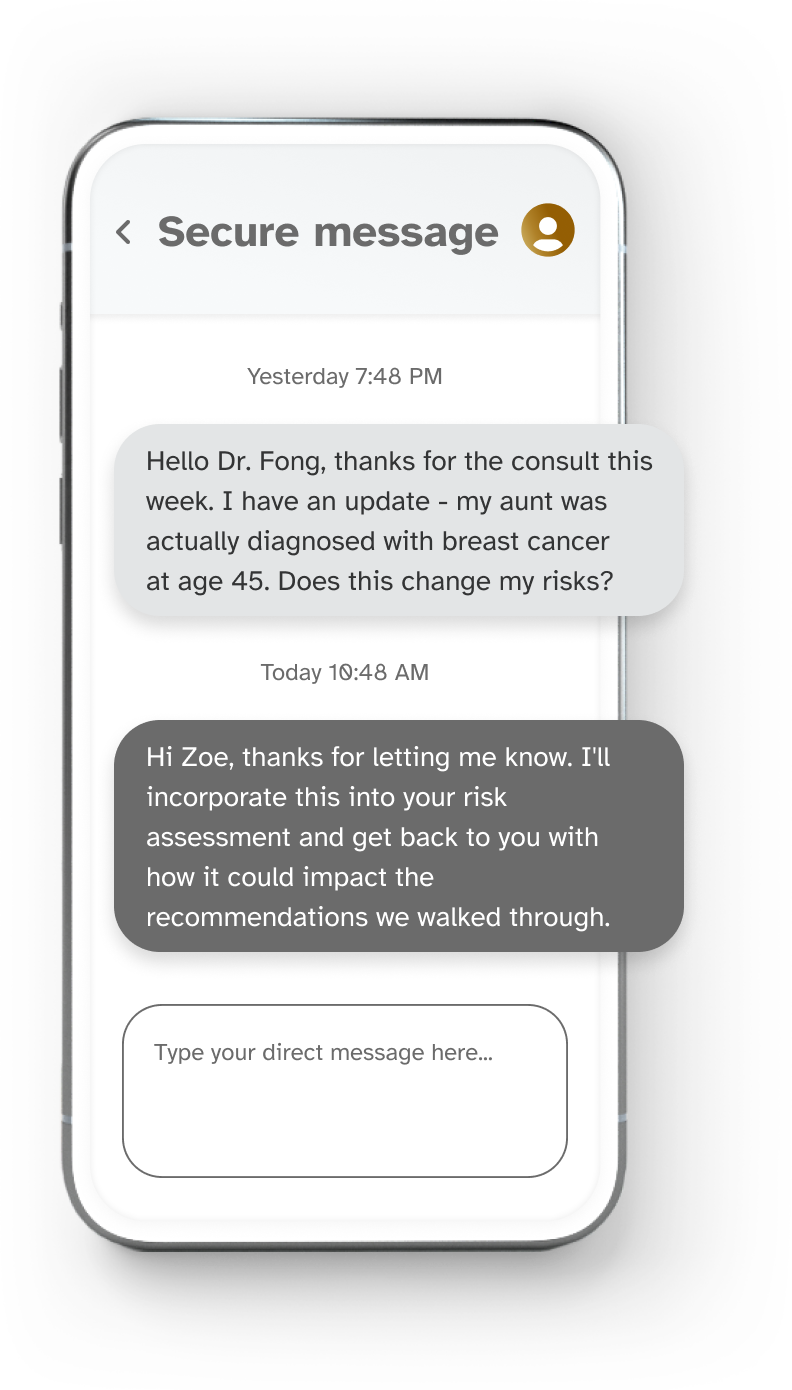

Virtual Clinical Consultation
A dedicated consultation to help you better understand your reports, generate risk assessments and provide next steps, with the ultimate goal of prevention.
Which service will you start with today?
Remember, you can always upgrade without having to spit again.
| Feature | Ancestry Service | Health plus Ancestry Service |
|---|---|---|
| Genotyping reports Genotyping examines DNA variants at certain pre-identified positions in the genome. The specific variants we look at generally provide coverage of commonly known variations across the entire genome. | 80+ | 150+ |
Just Added Exome Sequencing Reports Exome sequencing is an advanced genetic testing technique that focuses on decoding the exome of an individual's genome. The exome represents the protein-coding regions of genes, which make up only about 2% of the entire genome but contain the majority of genetic variants associated with disease risk. | ||
| Ancestry and Trait Reports | ||
| DNA Relative Finder and Family Tree (Opt in) | ||
| Health Predisposition reports*Learn about Considerations and Limitations for Health Predispositions Reports, Carrier Status Reports and Genetic Health Risks Learn how your genetics can influence your chances of developing certain health conditions. | 10+ | |
| Carrier Status reports*Learn about Considerations and Limitations for Health Predispositions Reports, Carrier Status Reports and Genetic Health Risks If you are starting a family, find out if you are a carrier for certain inherited conditions. | ||
| Wellness reports Learn how your genes play a role in your well-being and lifestyle choices. | 5+ | |
| Family Health History Tree Opt in to easily input, track and download your family health history to share with your healthcare provider. | ||
| Pharmacogenetics reports**Learn about Considerations and Limitations for Pharmacogenetics Reports Discover how your DNA may impact how your body processes certain medications with three new Pharmacogenetics reports. | ||
| Enhanced ancestry features Get advanced filtering for DNA Relative Finder and access up to 5000 more DNA relatives. | ||
| Ongoing new reports and features Get access to new premium reports and features throughout the year. | ||
Just Added Health TracksSM See how making healthy choices each day can greatly impact your health over time | ||
Just Added Health Action Plan Personalized and ongoing recommendations based on genetic and non-genetic data. | ||
Just Added Blood Testing Eligible participants may order in-person blood testing initiated by a clinician and get results in the 23andMe app. | ||
Just Added Genetics-based clinical care Access to clinicians with training in genetics. Includes unlimited direct messaging, plus a dedicated virtual consultation annually. |
Frequently Asked Questions
To be eligible for 23andMeplus Total Health, you must be 18 years or older and live in the US - excluding HI, NJ, NY, OK, RI and US territories (due to state and regional restrictions). You must not have received a blood transfusion in the last 30 days or a bone marrow transplant.
Currently, Total Health is only available to new, non-genotyped customers. If you're a current customer, we're still in the process of building an upgrade path for you to upgrade within your current account. We plan to have it available to you Spring 2024. We want to ensure all the foundations are in place for you to have an optimal experience with the service at a special upgrade price.
Because there are multiple steps involved with 23andMeplus Total Health, your reports will arrive over a period of time after you complete certain steps. The estimated timeline is as follows:
- You'll receive 190+ genotyping reports 4-6 weeks after registering your kit, spitting and shipping your sample.
- You'll receive your exome sequencing reports 7-12 weeks after you receive your genotyping reports.
- For each of the two blood tests, you'll receive your analysis of 55+ biomarkers 3-5 business days after completing your blood draw.
- You'll have unlimited messaging with clinicians after receiving your PGS results and the opportunity to schedule your virtual consultation once exome results are returned.
All saliva samples are processed in Clinical Laboratory Improvement Amendments (CLIA) certified and College of American Pathologists (CAP) accredited labs.
Clinical services are provided by healthcare providers which includes board-certified physicians and nurse practitioners. All clinicians have unique knowledge and training in genetics-based care.
Genotyping examines DNA variants at certain pre-identified positions in the genome. The specific variants we look at provide coverage of common known variations across the entire genome. Many variants can be accurately and efficiently examined at once using genotyping chips, also known as microarrays. This is the technology used to power the 190+ genotyping reports that you will receive.
Sequencing is an advanced type of genetic testing which involves determining the exact sequence of a certain length of DNA - a short piece, the whole genome, or parts of the genome such as the exome. It can be used to examine known variants, as well as identify variants that are unknown, providing you with a more complete picture of your genetic predispositions for certain health conditions. Exome sequencing looks at approximately40 times more DNA bases than microarray genotyping chips.
Exome sequencing is a specialized genetic sequencing technique that focuses on decoding the exome of an individual's genome. The exome represents the protein-coding regions of genes, which make up only about 1-2% of the entire genome but contain the majority of genetic variants associated with disease risk. By selectively sequencing these regions, exome sequencing provides valuable insights into an individual's genetic makeup, identifying variations that may be linked to specific genetic disorders or conditions. This technique is particularly useful for diagnosing rare genetic diseases and conducting research into the genetic basis of various medical conditions.
The 100+ genes included in the 23andMeplus Total Health Exome Sequencing reports were carefully selected to provide high-impact genetic risk information for 55+ conditions. These include all of the genes considered “medically actionable” by the American College of Medical Genetics and Genomics (ACMG) along with other genes that can provide both clinical and personal benefit. Overall, the genes selected can inform you about conditions that are often underdiagnosed. But, if detected early, there are many effective preventive measures and clinical interventions. See a full list of the genes and conditions .
Stay in the know.
Keep up-to-date with new discoveries and exclusive promotions on our DNA testing kits and services.
*The 23andMe PGS test includes health predisposition and carrier status reports. Health predisposition reports include both reports that meet FDA requirements for genetic health risks and reports which are based on 23andMe research and have not been reviewed by the FDA. The test uses qualitative genotyping to detect select clinically relevant variants in the genomic DNA of adults from saliva for the purpose of reporting and interpreting genetic health risks and reporting carrier status. It is not intended to diagnose any disease. Your ethnicity may affect the relevance of each report and how your genetic health risk results are interpreted. Each genetic health risk report describes if a person has variants associated with a higher risk of developing a disease, but does not describe a person’s overall risk of developing the disease. The test is not intended to tell you anything about your current state of health, or to be used to make medical decisions, including whether or not you should take a medication, how much of a medication you should take, or determine any treatment. Our carrier status reports can be used to determine carrier status, but cannot determine if you have two copies of any genetic variant. These carrier reports are not intended to tell you anything about your risk for developing a disease in the future, the health of your fetus, or your newborn child's risk of developing a particular disease later in life. For certain conditions, we provide a single report that includes information on both carrier status and genetic health risk. Warnings & Limitations: The 23andMe PGS Genetic Health Risk Report for BRCA1/BRCA2 (Selected Variants) is indicated for reporting of 44 variants in the BRCA1 and BRCA2 genes. The report describes if a person's genetic result is associated with an increased risk of developing breast cancer and ovarian cancer and may be associated with an increased risk for prostate cancer, pancreatic cancer, and potentially other cancers. The variants included in this report do not represent the majority of the BRCA1/BRCA2 variants in people of most ethnicities. This report does not include variants in other genes linked to hereditary cancers and the absence of variants included in this report does not rule out the presence of other genetic variants that may impact cancer risk. This report is for over-the-counter use by adults over the age of 18, and provides genetic information to inform discussions with a healthcare professional. The PGS test is not a substitute for visits to a healthcare professional for recommended screenings or appropriate follow-up. Results should be confirmed in a clinical setting before taking any medical action. For important information and limitations regarding each genetic health risk and carrier status report, visit 23andme.com/test-info/
**23andMe PGS Pharmacogenetics reports: The 23andMe test uses qualitative genotyping to detect 3 variants in the CYP2C19 gene, 2 variants in the DPYD gene and 1 variant in the SLCO1B1 gene in the genomic DNA of adults from saliva for the purpose of reporting and interpreting information about the processing of certain therapeutics to inform discussions with a healthcare professional. It does not describe if a person will or will not respond to a particular therapeutic. Our CYP2C19 Pharmacogenetics report provides certain information about variants associated with metabolism of some therapeutics and provides interpretive drug information regarding the potential effect of citalopram and clopidogrel therapy. Our SLCO1B1 Pharmacogenetics report provides certain information about variants associated with the processing of some therapeutics and provides interpretive drug information regarding the potential effect of simvastatin therapy. Our DPYD Pharmacogenetics report does not describe the association between detected variants and any specific therapeutic. Results for DPYD and certain CYP2C19 results should be confirmed by an independent genetic test prescribed by your own healthcare provider before taking any medical action. Warning: Test information should not be used to start, stop, or change any course of treatment and does not test for all possible variants that may affect metabolism or protein function. The PGS test is not a substitute for visits to a healthcare professional. Making changes to your current regimen can lead to harmful side effects or reduced intended benefits of your medication, therefore consult with your healthcare professional before taking any medical action. For important information and limitations regarding Pharmacogenetic reports, visit 23andme.com/test-info/pharmacogenetics/
